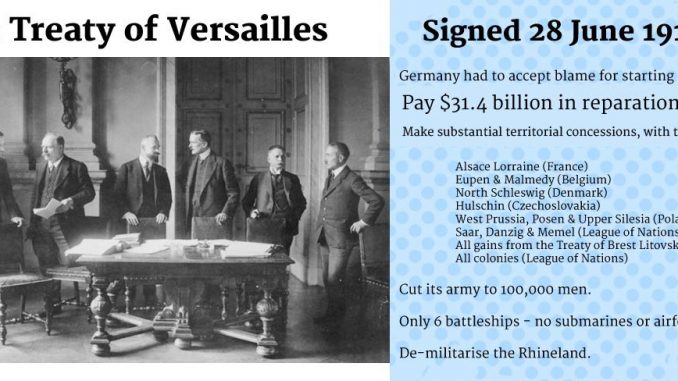
World War I officially ended with the signing of the Treaty of Versailles on June 28, 1919. Negotiated among the Allied powers with little participation by Germany, its 15 parts and 440 articles reassigned German boundaries and assigned liability for reparations. After strict enforcement for five years, the French assented to the modification of important provisions. Germany agreed to pay reparations under the Dawes Plan and the Young Plan, but those plans were cancelled in 1932, and Hitler’s rise to power and subsequent actions rendered moot the remaining terms of the treaty.
The German government signed the treaty under protest. Right-wing German parties attacked it as a betrayal, and terrorists assassinated several politicians whom they considered responsible. The U.S. Senate refused to ratify the treaty, and the U.S. government took no responsibility for most of its provisions.
For five years the French and the Belgians tried to enforce the treaty quite rigorously, leading in 1922 to their occupation of the Ruhr. In 1924, however, Anglo-American financial pressure compelled France to scale down its goals and end the occupation, and the French, assented to modifying important provisions of the treaty in a series of new agreements. Germany in 1924 and 1929 agreed to pay reparations under the Dawes Plan and the Young Plan, but the depression led to the cancellation of reparations in 1932. The Allies evacuated the Rhineland in 1930. Germany violated many disarmament provisions of Part V during the 1920s, and Hitler denounced the treaty altogether in 1935. From March 1937 through March 1939, Hitler overturned the territorial provisions of the treaty with respect to Austria, Czechoslovakia, and Memel, with at least the tacit consent of the western powers. On September 1, 1939, he attacked Poland to alter that frontier, as well.
One can never know whether either rigorous Franco-British enforcement of the original treaty or a more generous treaty would have avoided a new war. Certainly the British and American governments after 1945 sought to avoid many of the problems that had been raised by the Treaty of Versailles, especially regarding reparations, and the division of Germany and the Cold War enabled them generously to rebuild the western zones and to integrate them into a western alliance without renewing fears of German aggression. Meanwhile, they deferred certain fundamental issues for so long that no formal peace treaty was ever written to end World War II.



Be the first to comment